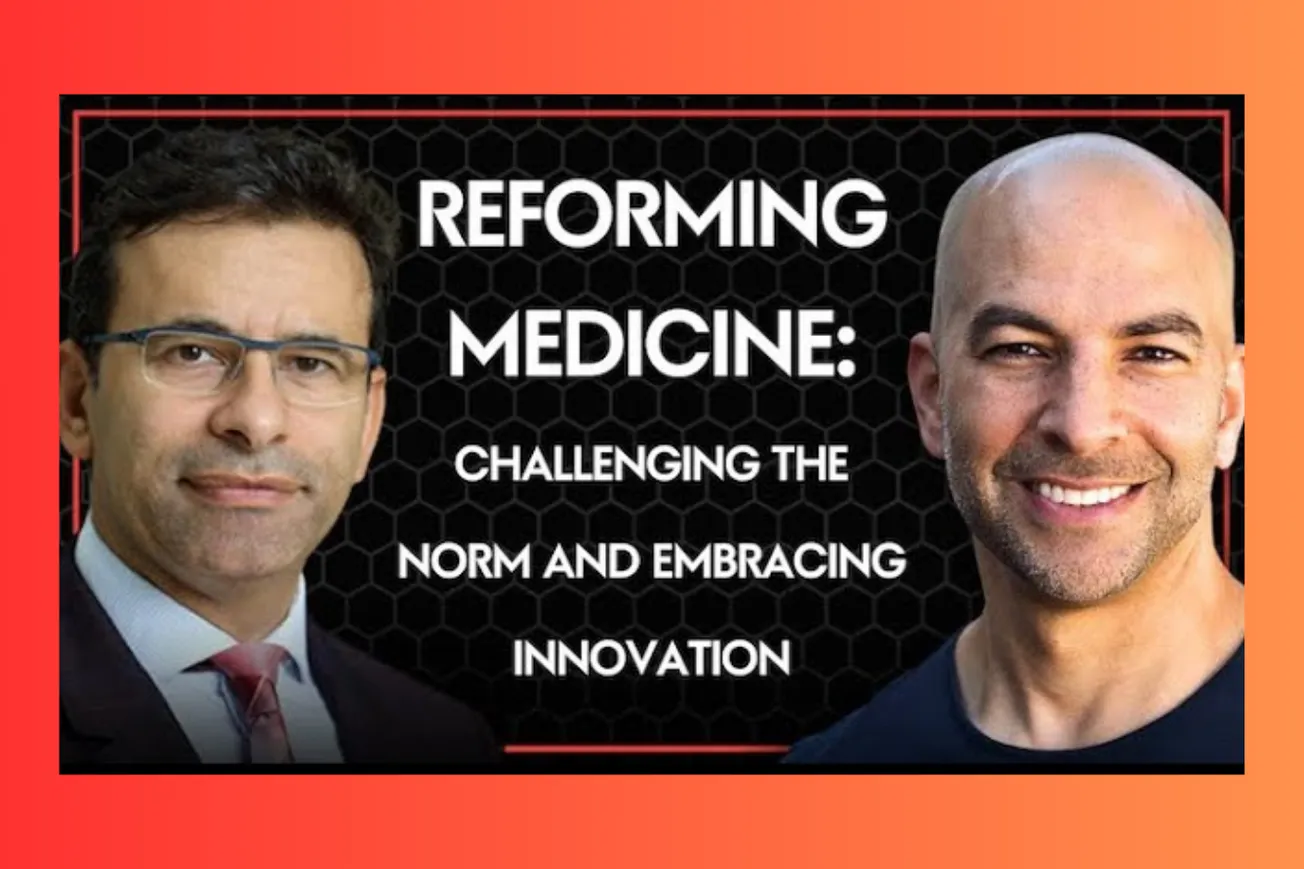Table of Contents
A surgeon reveals how cognitive bias and institutional resistance prevent medicine from challenging deadly assumptions that harm millions.
Key Takeaways
- Medical establishment's resistance to challenging assumptions has caused preventable harm across multiple health conditions
- Peanut allergy epidemic was largely created by misguided abstinence recommendations that ignored basic immunology principles
- Hormone replacement therapy hysteria deprived over 20 million women of beneficial treatment based on flawed interpretations
- Non-operative appendicitis treatment shows 67% success rate, challenging century-old surgical reflexes in appropriate cases
- Antibiotic overuse may contribute to rising chronic disease rates, with 60% of outpatient prescriptions being unnecessary
- Ovarian cancer predominantly originates from fallopian tubes, not ovaries, revolutionizing prevention strategies for high-risk women
- Medical education prioritizes rote memorization over critical thinking, producing doctors trained for obedience rather than innovation
- Financial incentives and institutional hierarchies often override scientific evidence in shaping medical practice patterns
Cognitive Dissonance Drives Medical Groupthink
Medical professionals fall victim to the same psychological traps that affect all human decision-making. Leon Festinger's groundbreaking research on cognitive dissonance explains why doctors cling to initial beliefs even when confronted with contradictory evidence. The brain actively resists uncomfortable conflicts between established views and new information.
- Festinger embedded himself in a Chicago cult expecting alien rescue to prove his theory about belief persistence under contradictory evidence
- When the predicted alien arrival failed, true believers doubled down rather than abandoning their convictions, demonstrating psychological investment protection
- Medical professionals exhibit identical patterns when their fundamental assumptions face scientific challenges, often dismissing contrary evidence rather than updating beliefs
- The "effort justification" principle means doctors who invested heavily in learning specific approaches become psychologically committed to defending those methods
- First-heard information creates lasting impressions that subsequent data must overcome, explaining why early medical training creates such persistent practice patterns
- Modern medicine's culture of certainty conflicts directly with science's inherently probabilistic nature, creating institutional resistance to hypothesis revision
Appendicitis Treatment Reveals Surgical Bias
The treatment of appendicitis demonstrates how medical reflexes can persist despite evidence supporting alternative approaches. For generations, surgical removal represented the only acceptable treatment, but recent research challenges this automatic response.
- Appendicitis historically killed over 60% of patients before surgical intervention, making the operation one of medicine's greatest advances
- Modern laparoscopic appendectomy became such a routine procedure that surgical teams approach it without questioning alternatives or appropriateness
- Randomized controlled trials now demonstrate that 67% of uncomplicated appendicitis cases resolve successfully with antibiotic treatment alone
- Patients avoiding surgery eliminate risks of general anesthesia, surgical complications, hernias, and infections while reducing healthcare costs significantly
- The 33% of antibiotic treatment failures can still undergo successful surgery without compromised outcomes or increased mortality risk
- Many surgeons continue requiring multiple randomized trials before accepting non-operative protocols, illustrating cognitive resistance to paradigm shifts
Peanut Allergy Epidemic Created by Medical Recommendations
The dramatic rise in peanut allergies represents one of modern medicine's most preventable public health disasters. Well-intentioned but scientifically unfounded recommendations transformed a rare condition into an epidemic affecting millions of children.
- Peanut allergy rates increased from 0.5% in 1999 to affecting approximately 1 in 18 children today, with severe anaphylactic reactions becoming commonplace
- The American Academy of Pediatrics recommended complete peanut abstinence for children ages 0-3 and pregnant/lactating mothers despite lacking supporting evidence
- Committee members later admitted they "literally had no idea" what to recommend but issued strong guidance anyway, creating institutional momentum
- Immunology principles of oral tolerance suggest early exposure builds immunity rather than sensitivity, contradicting the abstinence approach entirely
- Countries without peanut avoidance recommendations, including African nations, report virtually no peanut allergies among their populations
- Dr. Gideon Lack's 2015 randomized trial demonstrated eightfold differences in allergy rates between early exposure and abstinence groups
- Medical establishment doubled down on failed recommendations rather than acknowledging error, creating self-perpetuating cycles of increased restrictions and higher allergy rates
Hormone Replacement Therapy Hysteria Harmed Millions
The widespread abandonment of hormone replacement therapy following 2001 announcements represents medical communication at its most damaging. Flawed interpretation and sensationalized reporting deprived millions of women of beneficial treatment.
- Over 20 million women discontinued or avoided hormone therapy based on breast cancer warnings that subsequent analysis proved unfounded
- Investigative reporting revealed that study investigators themselves later confessed the therapy did not increase breast cancer deaths as originally claimed
- Committee member Bob Langer predicted during heated discussions that breast cancer claims would create irreversible public fear, proving prophetically accurate
- Long-term follow-up studies repeatedly confirmed no increase in breast cancer mortality, yet public perception remains largely unchanged from initial scare
- The asymmetry between fear-mongering announcements and quiet corrections exemplifies how medical institutions fail to correct course with appropriate vigor
- Modern hormone therapy represents potentially the most significant health intervention for postmenopausal women, yet continues facing resistance from outdated fears
- Medical establishment's failure to actively correct misinformation undermines public trust and perpetuates harmful treatment avoidance among eligible patients
Antibiotic Overuse Threatens Long-term Health
The routine overuse of antibiotics extends far beyond creating resistant bacteria. Emerging evidence suggests these medications may contribute to the modern epidemic of chronic diseases through microbiome disruption.
- Approximately 100,000 Americans die annually from antibiotic-resistant infections, with resistance development timelines shrinking from 23 years to just one year
- Studies indicate 60% of outpatient antibiotic prescriptions are medically unnecessary, representing massive overuse across healthcare systems nationwide
- Surgical antibiotic protocols extrapolated from open abdominal procedures to minimally invasive surgeries lacking evidence of infection risk or benefit
- Mayo Clinic research following 14,000 children found dramatic correlations between early antibiotic exposure and chronic diseases including obesity, ADHD, and asthma
- Dose-dependent relationships showed increasing antibiotic courses correlated with higher rates of learning disabilities (21% increase) and celiac disease (289% increase)
- The average 10-year-old American has received 11 courses of antibiotics, with critical microbiome development occurring during the most vulnerable early years
- Alexander Fleming himself warned against antibiotic overuse after discovering penicillin, predicting mass production would lead to dangerous misapplication
Ovarian Cancer Origins Challenge Surgical Dogma
Recent discoveries about ovarian cancer's true origins revolutionize prevention strategies while exposing how medical certainty can misdirect treatment for decades. The most lethal form of "ovarian" cancer actually originates elsewhere.
- Research demonstrates that the majority of deadly ovarian cancers actually originate in fallopian tubes, with cells subsequently migrating to ovaries
- Millions of healthy ovaries were removed preventively based on the false assumption that cancer originated from ovarian tissue
- Fallopian tube removal during other abdominal surgeries can massively reduce the 1-in-78 lifetime ovarian cancer risk without affecting hormone production
- Germany and Canada now routinely offer prophylactic fallopian tube removal during elective procedures for women finished with childbearing
- Pathologists faced ridicule when initially claiming ovarian cancer cells didn't resemble actual ovarian tissue, illustrating resistance to paradigm challenges
- This discovery explains why ovarian cancer screening methods universally failed and why chemotherapy targeting ovarian tissue showed limited success
- Standard practice at leading institutions now includes offering tube removal during gallbladder surgery and other abdominal procedures for appropriate candidates
Medical Education Stifles Innovation
The current medical education system prioritizes memorization over critical thinking, producing physicians trained for compliance rather than intellectual curiosity. Private organizations controlling curriculum resist meaningful reform despite obvious deficiencies.
- Medical students spend approximately 50% of education on rote memorization of enzyme names and molecular structures easily accessible via smartphone
- The American Association of Medical Colleges (AAMC) controls curriculum nationwide despite being a private organization with financial interests in maintaining current systems
- Students receive extensive transgender sensitivity training while getting minimal nutrition education, reflecting misplaced educational priorities
- Board certification requirements now demand ongoing payments to private organizations every two years, creating perpetual revenue streams from practicing physicians
- Medical school culture emphasizes obedience and hierarchy over questioning assumptions, producing graduates ill-equipped for scientific thinking
- Fifty percent of Johns Hopkins medical students pursue dual degrees, suggesting dissatisfaction with traditional medical education's narrow focus
- The current system beats creativity out of altruistic students through years of meaningless memorization rather than fostering intellectual development
Medicine stands at a crossroads between evidence-based progress and institutional inertia. True reform requires challenging the cognitive biases and financial incentives that perpetuate harmful practices despite mounting scientific evidence for change.





